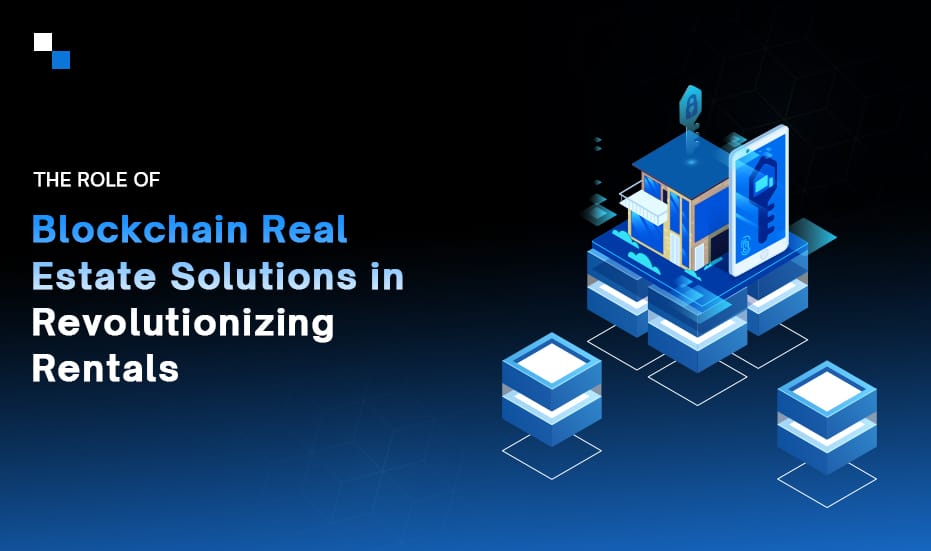
Emirates NBD Just Proved UAE Is Leading the Crypto Neo-Banking Market—Are You In Too?
April 1, 2025
Exploring the Impact of Blockchain Real Estate Solutions on Property Leasing
April 2, 2025According to a study by Apartment List, nearly 43.1% of American renters have encountered or fallen victim to a rental scam. These scams often involve fake listings, fraudulent landlords, and deceptive lease agreements, leading to financial losses and housing insecurity for many tenants.
As the global real estate rental market has grown from $2.69 trillion in 2024 to $2.91 trillion in 2025, it is likely that rental fraud will also rise in the coming years. To combat this, there is an urgent need for groundbreaking blockchain solutions for rental market to address its long-standing issues.
Blockchain has disrupted real estate industries through its decentralized ledger that promises transparent, immutable records. Even today, several players in this industry are beginning to explore its potential, particularly in addressing the chronic problems of both the commercial and residential rental market. But can blockchain be the fix we need, or is it just another overhyped tech trend? In this blog, we will explore the current state of the rental market and how blockchain real estate solutions can truly fix the broken ecosystem.
The Current State of the Rental Market
Before analyzing how blockchain real estate solutions can improve the rental market, it is crucial to understand the issues plaguing it:
1. Lack of Transparency and Trust
Rental agreements, property ownership records, and tenant data are typically stored in centralized databases controlled by private entities. These siloed systems are rarely accessible to all stakeholders. Tenants are usually unaware of how their personal information is used or shared. This opacity exposes the data to risks of manipulation, unauthorized access, and fraud. Moreover, both tenants and landlords often depend on intermediaries such as brokers and property management agencies, whose actions may not always align with their clients’ best interests.
2. High Transaction Costs and Inefficiencies
The rental process is inherently complex as it involves multiple intermediaries, such as real estate agents, property managers, and financial institutions. Each adds its own layer of service fees and increases the cost burden on both tenants and landlords. Furthermore, the reliance on manual verification for identity, income, and lease agreements results in significant delays and makes the overall process time-consuming. This antiquated, paper-heavy workflow increases the likelihood of errors, disputes, and administrative bottlenecks.
3. Tenant Screening and Identity Verification Issues
Credit scores and background checks currently lack consistency across regions, which makes it difficult for landlords to accurately gauge tenant reliability. Rental histories stored in fragmented, localized databases are also often not portable or verifiable when tenants relocate. This fragmentation makes it challenging for renters to clearly demonstrate past reliability. Hence, landlords need to rely on incomplete or inaccurate data. Such inefficiencies create barriers for tenants with good records.
4. Security and Fraud Concerns
Today, online rental marketplaces are increasingly plagued by fraud. Identity theft is also on the rise and exposes tenants to financial risk. Unauthorized subletting and unclear lease terms often lead to legal disputes that pose serious challenges for both landlords and tenants. These issues highlight the urgent need for more secure, transparent, and verifiable rental processes.
5. Payment Delays and Disputes
Landlords often struggle with late payments, and tenants lack proper channels for dispute resolution. Such rental systems are defined by low trust, high costs, and limited accessibility. In this case, adopting blockchain real estate solutions offers a strategic advantage that enables transparent, tamper-proof transactions, reduces fraud, and streamlines processes through decentralized ledgers and automated smart contracts.
The Rental Market Is Broken— Can Blockchain Fix It?
According to MarketsandMarkets, the global blockchain market size is projected to grow from USD 20.1 billion in 2024 to USD 248.9 billion by 2029 at a CAGR of 65.5% during the forecast period. This growth is expected to impact multiple sectors within real estate, and the rental market is also one of them.
Blockchain is a decentralized ledger of transactions that allows data to be stored across a network of computers in a secure, transparent, and tamper-proof way. Each block in the chain contains transaction data, and once a block is added, it cannot be changed.
In real estate, especially in rentals, blockchain can:
- Digitize contracts using smart contracts
- Enable secure identity verification
- Streamline payments using cryptocurrencies or tokenized assets
- Create immutable records for leases, payments, and tenant histories
- Facilitate peer-to-peer rentals without intermediaries
The data and capabilities of blockchain clearly demonstrate its potential to transform and fix the inefficiencies of the broken rental market.

How Blockchain Real Estate Solutions Strengthen the Rental Market
The following are the ways the blockchain real estate solutions set a new foundation for the rental market-
1. Verified Digital Identities
Identity fraud is a major issue in the rental industry. Blockchain can offer decentralized digital identity solutions that are secure and verifiable.
Tenants could create a digital identity on a blockchain platform, storing:
- Government ID verification
- Rental history
- Credit scores
- References
Landlords could verify this identity without needing to access sensitive documents. This speeds up the vetting process and reduces the risk of fraud. Platforms like Bloom are working on decentralized identity systems that could be integrated with rental platforms.
2. Smart Contracts: Automating Trust
One of the most promising blockchain applications in rentals is the use of smart contracts. These are self-executing contracts with the terms directly written into code.
For example, a rental agreement could be turned into a smart contract that automatically:
- Transfers a deposit to the landlord once the tenant signs the lease
- Releases monthly rent payments on a fixed date
- Initiates penalties for late payments
- Terminates the lease based on specific conditions
This eliminates the need for middlemen, reduces disputes, and speeds up processes.
For instance, blockchain rental solutions could allow tenants and landlords to finalize a lease within minutes, with funds automatically managed by the smart contract.
3. Transparent Rental Histories and Credit Scoring
A common challenge for renters is proving reliability, especially when moving to a new city or country. Blockchain real estate solutions can help by creating immutable rental histories that follow the tenant.
Each payment, maintenance request, or contract fulfillment could be recorded on the blockchain. This creates a trustworthy, tamper-proof record that both tenants and landlords can reference.
For instance, a tenant moving from London to New York could instantly share their rental history with a potential landlord, verified on a blockchain ledger.
4. Faster, Borderless Payments
Blockchain rental solutions support cryptocurrency and token-based payments that are faster, cheaper, and borderless. This is especially useful for:
- International tenants
- Digital nomads
- Remote property management
Tenants could pay rent using stablecoins (cryptocurrencies tied to fiat currency value), reducing conversion fees and delays.
For instance, a tenant working remotely in Bali could pay rent in USDC (a stablecoin), which the landlord in New York receives instantly without bank intermediaries.
5. Decentralized Rental Platforms
Peer-to-peer (P2P) rental platforms built on blockchain remove the need for centralized companies like Airbnb or Zillow. Instead, tenants and landlords interact directly through smart contracts.
These platforms can:
- Reduce service fees
- Increase competition
- Give users more control over data
Dtravel and Rentberry are examples of blockchain-based rental platforms gaining traction.
Real-World Examples of Blockchain in Rental Market
Several startups and projects are experimenting with blockchain in rentals:
1. Propy

Propy is a blockchain-based real estate platform that streamlines rental and property transactions. This platform leverages smart contracts for secure, transparent, and automated lease agreements. The automated transactions remove intermediaries, reduce fraud, and eliminate extensive paperwork while enabling cross-border property deals with cryptocurrency payments.
2. Rentberry

Rentberry is a decentralized rental platform that integrates blockchain to revolutionize long-term rental processes. It provides a platform where tenants can submit applications, sign smart contracts, and even crowdfund rental deposits. This eliminates security deposit disputes, enhances trust between landlords and tenants, and ensures immutable rental records for fair and transparent leasing agreements.
3. Dtravel

Dtravel is a blockchain-based alternative to home-sharing platforms like Airbnb. This platform allows property owners to list rentals and receive payments in cryptocurrency. Built on blockchain, it eliminates intermediaries, which reduces booking fees. Dtravel’s governance model involves hosts and guests in decision-making that helps build a more community-driven, secure, and cost-effective rental marketplace.
4. SafeRent

SafeRent utilizes blockchain for secure tenant screening and credit scoring. The smart contracts are used to ensure rent is paid on time and automate dispute resolution. With immutable rental history records, landlords can make informed decisions while tenants benefit from a more transparent and fair rental process without reliance on credit scores.
All the above-mentioned projects are still in the early stages, but they show real-world interest and potential.
Conclusion
The rental market is undeniably broken in many areas, but blockchain rental solutions offer a powerful opportunity for reform. With characteristics like transparency, trust, and automation, blockchain can address core inefficiencies and long-standing issues in the rental market that have persisted for years.
Given the rapid growth of blockchain in real estate, now is the perfect time to explore how it might reshape the residential and commercial rental experience. With Antier’s expert assistance in building blockchain real estate solutions, transforming rental processes becomes significantly easier.
Antier is a renowned blockchain real estate development company, supported by a team of over 700 blockchain professionals and a proven track record of delivering more than 1,200 projects across the blockchain domain. Our experts possess deep knowledge of various programming languages, enabling them to craft decentralized and secure solutions tailored for rental agreements and processes.
Connect with our team today for comprehensive blockchain real estate development needs!



